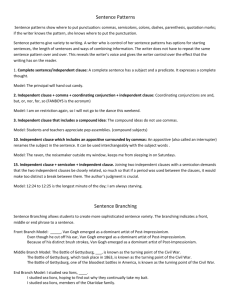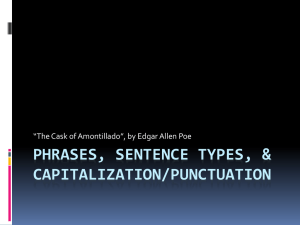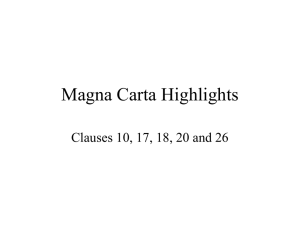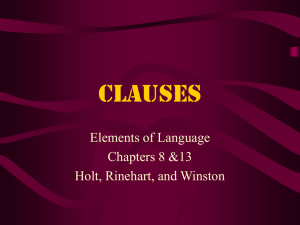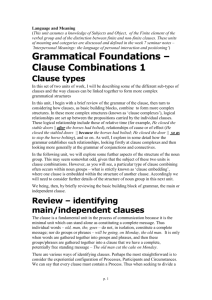Complex sentences
advertisement
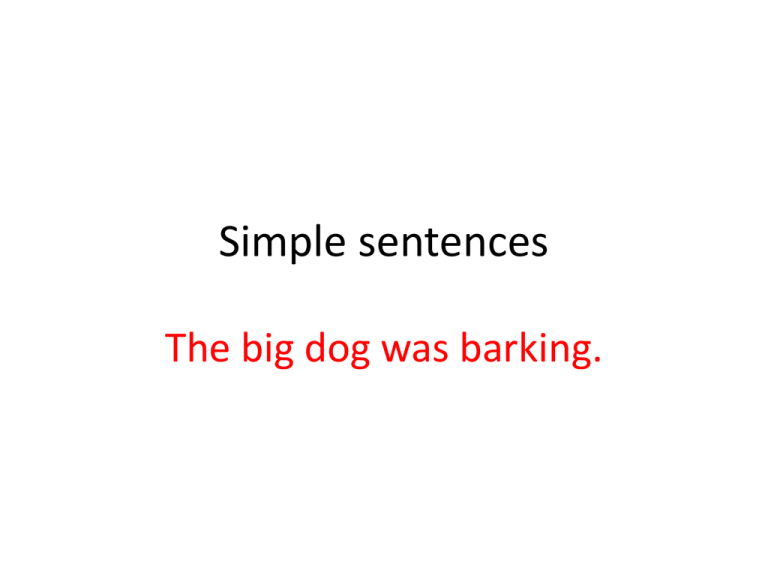
Simple sentences The big dog was barking. Compound sentences The boys walked down the road and their parents waved from the house. Complex sentences A complex sentence contains one main clause that can make sense on its own, and one or more minor (subordinate) clauses that are linked to it. When I arrived, the big dog was barking. The subordinate clause is When I arrived. Although it is a clause with a subject and a verb, it doesn't make sense on its own, it needs a main clause. More complex sentences You can add more minor clauses to make a more complex sentence: When I arrived, the big dog was barking because it was lonely. We can even split the main clause with a minor clause and still have a complex sentence. When I arrived, the big dog which was lonely, was barking. Alice entered the room (main clause) • who was shaking with fear • although she was scared • feeling full of confidence subordinate clauses • Write the above sentence using subordinate clauses in as many different ways as you can. You can split up Alice and entered the room. Punctuating a subordinate clause When you attach a subordinate clause in front of a main clause, use a comma, like this: Even though the broccoli was covered in cheese, Emily refused to eat it. When you attach a subordinate clause at the end of a main clause, you do not need to punctuate: Jill did poorly in her English exam because her best friend kept her up too late the night before. Relative clauses Subordinate clauses can begin with a relative pronoun (who, whose, which) and so are called relative clauses. In this case, the punctuation gets a bit trickier. It depends on whether the information is essential for understanding or not. For example: Relative clauses Nick gave a handful of chocolate to the dog who was sniffing around the table. (The information clarifies the animal so the clause is essential and requires no punctuation.) Nick gave a handful of chocolate to Poppy, who was sniffing around the table. (We know which animal he means so the clause is not essential and therefore needs to be separated. It is used for additional, descriptive information) OK, so why do I need to know all this? Writers uses subordination to combine ideas and make them more effective: Rhonda gasped. A six-foot snake slithered across the garden. Rhonda gasped when a six-foot snake slithered across the garden. Information flow If two ideas have unequal importance, save the most important one for the end so that your reader remembers it best. E.g. After eating his breakfast and cleaning his teeth, Guy Fawkes set off to blow up the Houses of Parliament. Start with verb + ing Compare: Liam realised he had finally been picked for the team when he looked down the list for his name. With: Looking down the list for his name, Liam realised he had finally been picked for the team. Writer’s tactics By using verb + ing our writer makes the reader feel more emotionally involved with Liam’s feelings. The reader can easily imagine Liam’s anticipation as he looks down the list. The order of words in the sentence is effective because the writer withholds the good news until the end! Using this in your essays Compare: The poet uses colloquial language in his poem “The Man He Killed”. This suggests that the narrator is a working class man. With: By using colloquial language in his poem “The Man He Killed”, the poet suggests to the reader that the narrator is a working class man. More examples Compare: Shakespeare makes blunt, critical statements about his mistress’s looks in “Sonnet 130”. She doesn’t match up to popular ideals of beauty in Elizabethan times. This goes against the reader’s expectations. With: By highlighting his mistress’s faults in “Sonnet 130”, Shakespeare goes against the reader’s expectations. Saying that she doesn’t match up to popular ideals of beauty in Elizabethan time, is his way of showing that she is beautiful in a more genuine way. Don’t forget the comma • Don’t forget, a clause beginning with an ing verb is a subordinate clause as it doesn’t make sense on its own, so it must have a comma before the rest of the sentence. • Write your own sentence starting with ing. Start with ed Compare: Kylie decided to relax in the jacuzzi because she was tired from the snowboarding. With: Tired from all the snowboarding, Kylie decided to relax in the jacuzzi. Writer’s tactics Perhaps this writer thinks the most important information should come first – the fact that it’s snowboarding that has made Kylie tired. The writer is putting the order of events in the sentence in the same order that they happened in real –time snowboarding first followed by relaxing. Write your own sentence using an ‘ed’ word e.g. Dressed or shouted at. Don’t forget the comma. Active and Passive Active: Airport police arrested Pete Doherty at Heathrow Airport yesterday. Passive: Pete Doherty was arrested by airport police at Heathrow Airport yesterday. Short passive: Pete Doherty arrested yesterday! More examples Police shot protestors at a rally in London. Protestors shot by police at a rally in London. Protestors shot at a rally in London. Protestors shot at a rally. Protestors shot. Positive or negative views? Modal verbs Express likelihood or probability of something happening: Two million jobs will be lost Two million jobs may be lost Two million jobs might be lost Two million jobs could be lost Modal verbs Can also express obligation or necessity: We have to work very hard with our revision. We must work very hard with our revision. We ought to work very hard with our revision. We should work very hard with our revision. We are supposed to work very hard. Exercises • Write your own sentences using the active and passive. • Write your own sentences using modal verbs and indicate the degree of obligation needed.




